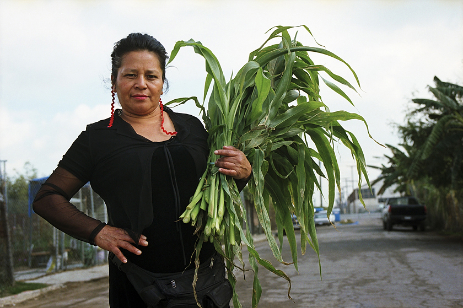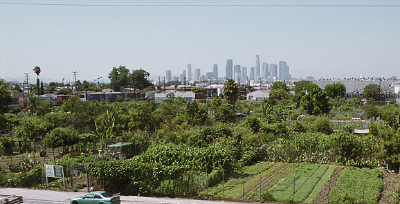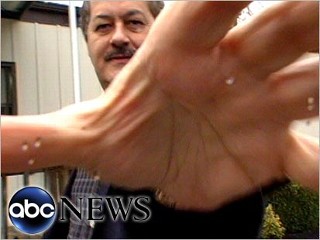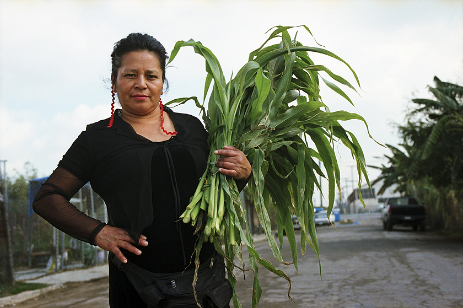 South Central Farm activist Kati Lopez with armload of fresh corn leaves.Black Valley FilmsJust how much trouble can one community garden start? For starters, three years of court proceedings, two eviction notices, one assault charge, countless allegations of corruption, and $16 million worth of fundraising. Even with all the legal crap, the gardeners still had to pay for manure.
South Central Farm activist Kati Lopez with armload of fresh corn leaves.Black Valley FilmsJust how much trouble can one community garden start? For starters, three years of court proceedings, two eviction notices, one assault charge, countless allegations of corruption, and $16 million worth of fundraising. Even with all the legal crap, the gardeners still had to pay for manure.
Scott Hamilton Kennedy’s Oscar-nominated documentary, “The Garden,” tells the story of a 14-acre plot in Los Angeles that became a community garden in 1992, a community-building effort undertaken in the wake of the Rodney King riots. For 12 years, the South Central Farm operated in relative peace on city-owned property, providing lots for 347 predominantly Latino families, and laying claim to the title of “the largest community garden in the country.” Not bad for a city known more for its traffic congestion than its open spaces.
But in late 2003, in a closed-door session, the L.A. City Council sold the property to a real estate developer for $5 million. The buyer promptly posted eviction notices at the garden, effective in February 2004. But instead of packing it all in, the South Central Farmers decided to fight the property sale for their right to grow food in that space.
At this point in the narrative, the film starts to be less about the need for urban community gardens and more about the particular brand of corrupt politics in L.A. that was willing t South Central Farm with L.A. skyline in background.Black Valley Filmso sacrifice the garden for money, storage units, and soccer fields (yes, soccer fields, you’ll have to watch the film to understand). Kennedy includes many shots of smiling gardeners tending to their plots, but provides little substance about the value that a garden can bring to a community.
South Central Farm with L.A. skyline in background.Black Valley Filmso sacrifice the garden for money, storage units, and soccer fields (yes, soccer fields, you’ll have to watch the film to understand). Kennedy includes many shots of smiling gardeners tending to their plots, but provides little substance about the value that a garden can bring to a community.
And other than a bit of he-said-she-said back-and-forth between the South Central Farmers and the Concerned Citizens of L.A. (proponents of the soccer fields), we don’t have any information about how the greater community felt about the garden. Were the South Central Farmers even from that neighborhood? The audience doesn’t know.
What we do know is that the South Central Farm became a cause célèbre for the Hollywood crowd. Joan Baez and Willie Nelson visited, and Daryl Hannah lived in a tent at the farm for a little while. And, of course, politicians tried to bask in the limelight; Rep. Maxine Waters (D-Calif.) and former Democratic presidential candidate Dennis Kucinich came in for a last-minute fundraiser and photo-op.
What struck me as most fascinating about The Garden, is that if the legal face-off had taken place in 2008 instead of 2004, I imagine the public outcry would have been much more intense. It’s hard to imaging that city officials would taking away free access to local food now, when a) Los Angeles is struggling more than ever to feed its citizens, and b) the politics of food has exploded in the public consciousness.
Regardless of The Garden’s timeliness, Kennedy’s tour de force of the political injustices inflicted on the South Central Farm can be seen as the “Who Killed the Electric Car?” of the community garden set. There simply isn’t a better case study for budding community-garden activists. And even if you aren’t of the activist persuasion, The Garden is well worth the $10 and 80 minutes it will take to learn the fate of L.A.’s South Central Farm.
Watch It: The Garden is showing at the Seattle International Film Festival on May 30. Check the SIFF schedule for details. For readers outside of Seattle, the film is still being shown around the country; check the Black Valley Films website for details on those screenings.



